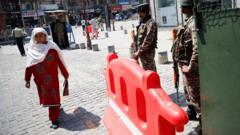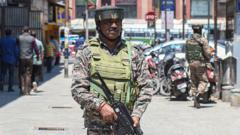The recent arrest of Ekrem Imamoglu, a key opposition figure in Turkey, triggers fears of democratic decline, with observers noting a growing authoritarian trend in the nation's politics.**
Arrest of Istanbul's Mayor Sparks Concerns Over Turkey's Democratic Future**

Arrest of Istanbul's Mayor Sparks Concerns Over Turkey's Democratic Future**
Critics accuse President Erdogan of using legal tactics to undermine political competition as tensions rise ahead of the presidential elections.**
In a dramatic turn of events, opposition leader and Istanbul Mayor Ekrem Imamoglu was detained by authorities just days before being named the presidential candidate for Turkey's opposition. The move has sent shockwaves through the political landscape, raising questions about the integrity of Turkey's democracy under President Recep Tayyip Erdogan.
With Erdogan facing a myriad of challenges, including high inflation and declining popularity of his ruling party, the arrest of his main political rival has sparked outrage. Critics assert that Imamoglu's detention is a tactical maneuver to stifle any competition in the upcoming elections, potentially securing Erdogan's grip on power.
The implications of this incident extend beyond Turkish borders, as analysts indicate that the fate of the nation's democratic framework hangs in the balance. “Arresting a presidential hopeful marks a troubling shift toward authoritarianism. It presents a worrisome picture of the future of democracy in Turkey,” noted Arife Kose, a political scholar from the University of East Anglia in the UK.
Erdogan has maintained political dominance since 2003 and has not shied away from using state power to bolster his authority. With accusations of corruption and terrorism levied against Imamoglu, many observers are left questioning the legitimacy of the electoral process moving forward, as Turkey stands at a critical juncture that could redefine its political landscape and democratic values.
With Erdogan facing a myriad of challenges, including high inflation and declining popularity of his ruling party, the arrest of his main political rival has sparked outrage. Critics assert that Imamoglu's detention is a tactical maneuver to stifle any competition in the upcoming elections, potentially securing Erdogan's grip on power.
The implications of this incident extend beyond Turkish borders, as analysts indicate that the fate of the nation's democratic framework hangs in the balance. “Arresting a presidential hopeful marks a troubling shift toward authoritarianism. It presents a worrisome picture of the future of democracy in Turkey,” noted Arife Kose, a political scholar from the University of East Anglia in the UK.
Erdogan has maintained political dominance since 2003 and has not shied away from using state power to bolster his authority. With accusations of corruption and terrorism levied against Imamoglu, many observers are left questioning the legitimacy of the electoral process moving forward, as Turkey stands at a critical juncture that could redefine its political landscape and democratic values.


















